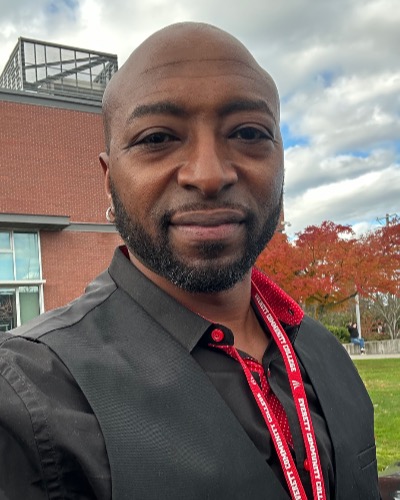Criminal Justice
Centralia College offers a comprehensive course of study designed to prepare students for a wide variety of careers in law enforcement, corrections, private investigations, or the social services.
 This accelerated degree program can be completed in as little as 15 months of full-time
study. Additionally, we provide a transfer program for students who are looking to
further their academics and transfer to a four-year college.
This accelerated degree program can be completed in as little as 15 months of full-time
study. Additionally, we provide a transfer program for students who are looking to
further their academics and transfer to a four-year college.
Degree Options
There are two-degree options for students – an Associate in Applied Science with an emphasis in Criminal Justice and an Associate of Arts degree with an emphasis in Criminal Justice. We also provide a certificate program for those looking to do Crime Scene Investigations.
Credits for Work Experience
For adults already working as police officers, deputy sheriffs, or state troopers, Centralia College is the only college or university in Washington to award 50 credits for that work experience in the Criminal Justice Crosswalk Degree program. The Crosswalk program allows law enforcement officers to fast-track their way to an associate degree by aligning the Centralia College curriculum with the Washington State Criminal Justice Training Commission Basic Law Enforcement Academy and the Washington State Patrol Academy training programs.
Why Centralia College?
Centralia College students enjoy the option of taking either a traditional classroom or fully online courses. Classes are taught by a criminology Ph.D. graduate or a previous law enforcement professional who have extensive knowledge of our criminal justice system.
CC's curriculum is designed to academically prepare students for careers as peace officers with local or state law enforcement agencies or correctional institutions.
Upon successful completion, students will have demonstrated the ability to:
- Discuss and demonstrate basic procedures related to the fields of law enforcement and corrections.
Utilize knowledge about state and federal laws that impact law enforcement and corrections in decision making.
Understand and discuss the difference in relationships between law enforcement, the community and other legal entities.
Understand and describe the relationships that exist between the various law enforcement, corrections, and the courts systems and at the local, state and federal levels of government.
Discuss ethics as related to law enforcement and corrections.
Emphasis: Criminal Justice
Degree: Associate in Applied Science
Total Credits: 90-93
Notes for Students - Recommended Electives
- SPAN& 121 Spanish I - 5 credits
- PSYC& 100 General Psychology - 5 credits
- SOC& 101 Introduction to Sociology - 5 credits
- BTEC 101 Keyboarding for Business - 3 credits
- BTEC 221 Business Communications - 5 credits
| First Year | |
| Fall Quarter |
|
| Winter Quarter |
|
| Spring Quarter |
|
| Summer Quarter |
|
| Second Year | |
| Fall Quarter |
|
Student learning is central to the college’s mission. All associate of arts, associate of science, and MRP/DTA degrees are designed to provide experiences that lead to the attainment of general education outcomes as embodied in the following student learning competencies:
- Critical Analysis: the student effectively evaluates information and creates solutions through observation, reflection, reasoning, and experience.
- Communication: the student effectively conveys information and ideas by adapting their communication style to different situations and audiences when speaking, writing, and listening to others.
- Global Awareness & Cultural Competency: the student effectively engages with the multi-cultural world by studying the practices and perspectives of varying communities and cultures.
- Information Literacy: the student effectively engages in a reflective process of inquiry to find, evaluate, use, and ethically create content.
Degree: Associate in Arts
Emphasis: Criminal Justice
Note for Students
- The Criminal Justice emphasis can be tailored to meet both the career path objectives of the individual and coordinate planning to a four year school. An advisor can provide additional information on this.
| First Year | |
| Fall Quarter |
|
| Winter Quarter |
|
| Spring Quarter |
|
| Summer Quarter |
|
| Second Year | |
| Fall Quarter |
|
| Winter Quarter |
|
Upon successful completion, students will have demonstrated the ability to:
- Understand basic concepts of criminal and forensic investigation and the functions of a forensic specialist.
- Identify crime scene considerations of investigators for a variety of different crime scenes. •
- Employ proper and appropriate evidence collection, preservation, documentation and transport techniques of all evidence identified at the crime scene.
Degree: Certificate of Proficiency
Emphasis: Criminal Investigation
Total Credits: 55
| Core Classes | Related Instruction |
|
|
 Dr. Tionna Miller
Dr. Tionna Miller
Dr. Tionna Miller received both her bachelor’s degree in Criminal Justice and her master’s in Social Work from the University of Washington-Tacoma Campus. She later received her doctorate degree in Criminology from the University of Arkansas at Little Rock. Her research and expertise are in Corrections, Re-entry, Mass Incarceration, Alternatives to Incarceration, Mental Health for Justice Involved Individuals, Social Work within Policing, and Community Policing.
 Michael McFadden
Michael McFadden
Michael McFadden spent 15 years in Law Enforcement as a Patrol Officer, Instructor, K9 Officer, Field Training Officer-Mentor (FTO), and Corrections Officer. He has a teaching/instructor platform in Law Enforcement. He medically retired in October 2018 due to injury. He began pursuing his master’s degree in Criminal Justice in August 2019 and completed that degree in December 2020. He currently teaches Criminal Justice at both Centralia College and Everett Community College. He teaches in online modalities and has been involved in student advising and curriculum development. He teaches various courses, from Criminology to Criminal Law. He was born and raised in South Carolina and served in the U.S Marine Corps and Coast Guard for almost 8 years. He grew up in a culturally and economically challenging area in South Carolina and his background, experiences, education, and training give him a unique perspective.
Contact
Dr. Tionna Miller
Assistant Professor of Criminal Justice
TransAlta Commons, Room 327
360-623-8587
Email Dr. Tionna Miller
